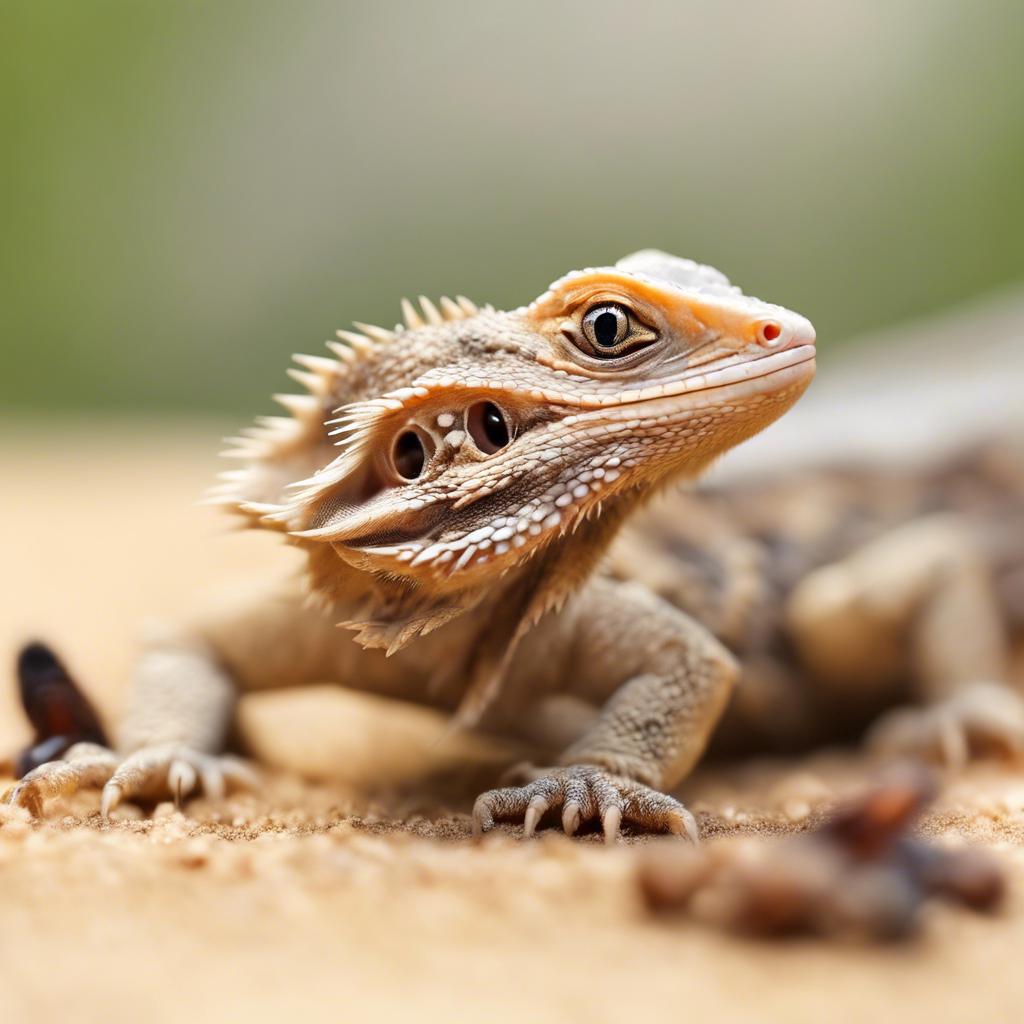Bearded dragons are popular reptile pets known for their unique appearance and docile nature. These lizards are native to Australia and have become increasingly popular as pets due to their friendly demeanor and relatively low maintenance requirements. One important aspect of caring for a bearded dragon is providing them with a nutritious and balanced diet.
Dubia roaches, also known as Blaptica dubia, are a type of feeder insect that has gained popularity as a food option for bearded dragons. These roaches are native to Central and South America and are known for their high nutritional value. They are an excellent source of protein, calcium, and other essential nutrients that are crucial for the growth and development of baby bearded dragons.
Key Takeaways
- Dubia roaches are a nutritious food option for baby bearded dragons.
- Feeding dubia roaches to baby bearded dragons requires proper quantity and frequency.
- Benefits of feeding dubia roaches to baby bearded dragons include high protein and calcium content.
- Potential health issues of feeding dubia roaches to baby bearded dragons include impaction and bacterial infections.
- Proper bearded dragon care is important for overall health, including diet and nutrition.
Nutritional Value of Dubia Roaches for Baby Bearded Dragons
Dubia roaches are highly nutritious and offer several benefits when included in a baby bearded dragon's diet. They have a high protein content, which is essential for muscle development and overall growth. In addition to protein, dubia roaches also contain important vitamins and minerals such as calcium, magnesium, and phosphorus.
Compared to other common feeder insects such as crickets or mealworms, dubia roaches have a higher nutritional value. They have a lower fat content and higher protein-to-fat ratio, making them an ideal choice for baby bearded dragons who require a high-protein diet for proper growth. The calcium-to-phosphorus ratio in dubia roaches is also optimal, which is important for bone health in growing reptiles.
How to Feed Dubia Roaches to Baby Bearded Dragons
When introducing dubia roaches to a baby bearded dragon's diet, it is important to do so gradually. Start by offering small-sized roaches that are appropriate for the size of the lizard. This will prevent any choking hazards or digestive issues. It is also recommended to gut-load the roaches before feeding them to the bearded dragon. Gut-loading involves feeding the roaches with nutritious foods such as fruits, vegetables, and commercial gut-loading diets to enhance their nutritional value.
To feed dubia roaches to a baby bearded dragon, place a few roaches in a shallow dish or directly in the enclosure. Bearded dragons are visual hunters, so they will be attracted to the movement of the roaches. It is important to monitor the feeding process to ensure that the baby bearded dragon is eating and not being overwhelmed by the roaches. Remove any uneaten roaches after a few minutes to prevent them from hiding in the enclosure.
Quantity and Frequency of Dubia Roaches in Baby Bearded Dragon's Diet
The recommended amount of dubia roaches for a baby bearded dragon's diet depends on their age and size. As a general guideline, baby bearded dragons should be fed as much as they can eat in 10-15 minutes, two to three times a day. The number of dubia roaches offered can vary, but it is important not to overfeed or underfeed the lizard.
For baby bearded dragons that are around 2-3 months old, offering 10-15 appropriately sized dubia roaches per feeding is a good starting point. As they grow, the number of roaches can be increased gradually. It is important to monitor the lizard's weight and overall health to ensure that they are receiving an adequate amount of food.
Benefits of Feeding Dubia Roaches to Baby Bearded Dragons
Feeding dubia roaches to baby bearded dragons offers several health benefits. The high protein content in these insects promotes healthy muscle development and growth in young lizards. The optimal calcium-to-phosphorus ratio in dubia roaches also contributes to proper bone development and prevents metabolic bone disease, a common health issue in reptiles.
In addition to their nutritional value, dubia roaches are also easy to digest for baby bearded dragons. Their soft exoskeleton makes them a suitable food option for young lizards with developing digestive systems. Feeding dubia roaches can also help prevent boredom and stimulate natural hunting behaviors in bearded dragons.
Potential Health Issues of Feeding Dubia Roaches to Baby Bearded Dragons

While dubia roaches are generally safe and nutritious for baby bearded dragons, there are some potential health concerns to be aware of. One issue that can arise is the risk of impaction if the roaches are too large or if the lizard consumes too many at once. Impaction occurs when the digestive system becomes blocked by undigested food or foreign objects, leading to serious health complications.
To avoid impaction, it is important to offer appropriately sized dubia roaches and monitor the feeding process. If a baby bearded dragon shows signs of impaction such as loss of appetite, lethargy, or bloating, it is important to seek veterinary care immediately.
Precautions to Take When Feeding Dubia Roaches to Baby Bearded Dragons
When feeding dubia roaches to baby bearded dragons, it is important to take certain precautions to ensure the safety and health of the lizards. It is recommended to purchase dubia roaches from reputable breeders or suppliers to ensure that they are free from pesticides or other harmful substances. Avoid collecting roaches from the wild as they may carry parasites or diseases.
Before offering dubia roaches to a baby bearded dragon, it is important to quarantine them for a few days. This allows time to observe the roaches for any signs of illness or disease. Quarantining also helps prevent the introduction of any potential pathogens into the lizard's enclosure.
Alternative Food Options for Baby Bearded Dragons
While dubia roaches are an excellent food option for baby bearded dragons, there are other feeder insects that can be included in their diet. Crickets, mealworms, and phoenix worms are commonly fed to bearded dragons and offer their own nutritional benefits. Each insect has its own unique nutritional profile, so it is important to provide a varied diet to ensure that the lizard receives a wide range of nutrients.
When choosing alternative food options, it is important to consider the nutritional content, size, and ease of digestion. Some insects may be higher in fat or have a less optimal calcium-to-phosphorus ratio, so it is important to balance the diet accordingly.
Importance of Proper Bearded Dragon Care for Overall Health
While a balanced diet is crucial for the overall health of a bearded dragon, there are other important factors to consider as well. Providing a suitable enclosure with proper temperature and lighting is essential for their well-being. Bearded dragons require a basking spot with temperatures around 95-105°F (35-40°C) and a cooler area around 80-85°F (27-29°C). UVB lighting is also necessary for proper calcium absorption and overall health.
Maintaining proper hygiene in the enclosure is also important to prevent the growth of bacteria or parasites. Regular cleaning of the enclosure and providing fresh water daily are essential for maintaining a healthy environment for the bearded dragon.
Dubia Roaches as a Healthy and Nutritious Food Option for Baby Bearded Dragons
In conclusion, dubia roaches are an excellent food option for baby bearded dragons due to their high nutritional value and ease of digestion. They provide essential nutrients such as protein and calcium that are crucial for the growth and development of young lizards. When feeding dubia roaches to baby bearded dragons, it is important to introduce them gradually and monitor the feeding process to prevent any health issues.
While dubia roaches are a beneficial food option, it is important to provide a varied diet that includes other feeder insects as well. Proper care and attention to the bearded dragon's overall health, including temperature, lighting, and hygiene, are also crucial for their well-being. By providing a balanced diet and proper care, baby bearded dragons can thrive and grow into healthy adult lizards.
If you're wondering whether baby bearded dragons can eat dubia roaches, you may also be interested in learning about the potential risks of stress on these reptiles. Stress can have serious consequences for bearded dragons, and it's important to understand how to minimize it. Reptile Wizard has an informative article on this topic titled “Can Bearded Dragons Die from Stress?” that explores the various factors that can contribute to stress in these pets and offers helpful tips on how to create a calm and comfortable environment for them. Check out the article here to ensure the well-being of your baby bearded dragon.
FAQs
What are baby bearded dragons?
Baby bearded dragons are young bearded dragons that are typically less than a year old. They are small in size and require a specific diet to ensure proper growth and development.
What are dubia roaches?
Dubia roaches are a type of feeder insect that are commonly used to feed reptiles. They are high in protein and low in fat, making them a nutritious food source for many reptiles.
Can baby bearded dragons eat dubia roaches?
Yes, baby bearded dragons can eat dubia roaches. In fact, dubia roaches are a great food source for baby bearded dragons because they are small in size and easy to digest.
How often should baby bearded dragons be fed dubia roaches?
Baby bearded dragons should be fed dubia roaches once or twice a day, depending on their age and size. It is important to monitor their food intake and adjust accordingly to ensure they are getting the proper amount of nutrients.
Are there any risks associated with feeding baby bearded dragons dubia roaches?
There are no significant risks associated with feeding baby bearded dragons dubia roaches, as long as the roaches are properly gut-loaded and dusted with calcium powder. However, it is important to monitor their food intake and ensure they are not overeating or becoming impacted.

